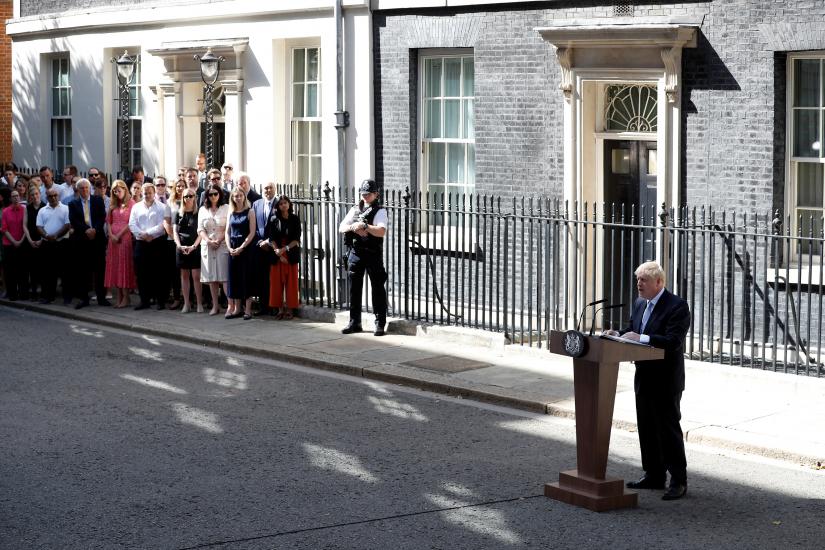 Brexit lies at the heart of Boris Johnson's agenda as the new prime minister of Britain and his first speech to Parliament on Thursday (Jul 25) focussed on working "flat out" to meet the Oct 31 deadline for the UK to leave the European Union (EU).
Brexit lies at the heart of Boris Johnson's agenda as the new prime minister of Britain and his first speech to Parliament on Thursday (Jul 25) focussed on working "flat out" to meet the Oct 31 deadline for the UK to leave the European Union (EU).
But among some of the other pressing issues, a new government led by him is expected to focus on is a "radical rewriting" of the country's immigration and visa policies, with Priti Patel in charge of the UK Home Office.
He told MPs in the House of Commons: "We will also ensure that we continue to attract the brightest and best talent from around the world. No-one believes more strongly than me in the benefits of migration to our country. But I am clear that our immigration system must change. For years, politicians have promised the public an Australian-style points-based system.
"And today I will actually deliver on those promises - I will ask the Migration Advisory Committee to conduct a review of that system as the first step in a radical rewriting of our immigration system. I am convinced that we can produce a system that the British public can have confidence in."
The new system will be modelled more closely on the Australian system, which is based on the skills of any visa applicant and aimed at treating immigrants from all parts of the world at par with the EU post-Brexit.
It is here that Johnson and his fellow Brexiteers, including Patel, will be tested on their promise in the lead up to the June 2016 referendum of a more favourable regime for curry chefs from countries like Bangladesh will come up for its true test.
Restaurant chefs have held them responsible for "Brexit Betrayal" after galvanising the country’s largely Bangladeshi-origin curry industry to vote “Leave” in the referendum by claiming a Brexit vote would allow a relaxation of non-EU immigration rules and “save” British curry houses.
Enam Ali, born in Sylhet before moving to the UK in the 1970s to study, has since founded Le Raj Academy in the UK to train the next generation of curry chefs in reaction to the government’s failure to live up to the promise of making it easier for the industry to source much-needed staff from Bangladesh.
“Staff shortages mean many of us are struggling to meet customer expectations, and it is almost impossible to expand as we would like to,” says Ali, who was conferred the royal honour of MBE for his services to Britain's curry industry in 2009.
It is estimated that 90 percent of UK curry restaurants are currently affected by a crippling shortage of chefs, which is causing an average of two curry restaurant closures each week.
It remains to be seen what kind of action is taken by Johnson, who is now in charge of the policies and has committed to a "do or die" approach to meeting the Oct 31 Brexit deadline.
He said: “Our mission is to deliver Brexit on the 31st of October for the purpose of uniting and re-energising our great United Kingdom and making this country the greatest place on earth… I will work flat out to make it happen.
“There is every chance that in 2050, when I fully intend to be around, though not necessarily in this job, we will look back on this period, this extraordinary period, as the beginning of a new golden age for our United Kingdom.”
In a clear message to Brussels to return to the negotiating table, the new Prime Minister said his team was ready to negotiate an alternative in good faith, with provisions to ensure that the Irish border issues are dealt with in the negotiations on the future agreement between the UK and the EU.
“For our part, we will throw ourselves into these negotiations with the greatest energy and determination and in the spirit of friendship. And I hope that the EU will be equally ready and that they will rethink their current refusal to make any changes to the Withdrawal Agreement,” he said, renewing his warning of being ready to leave the 28-member economic bloc without a deal in place.
“If they do not, we will, of course, have to leave the EU without an agreement under Article 50. The UK is better prepared for that situation than many believe. But we are not as ready yet as we should be. In the 98 days that remain to us we must turbo-charge our preparations to make sure that there is as little disruption as possible to our national life,” he said.


